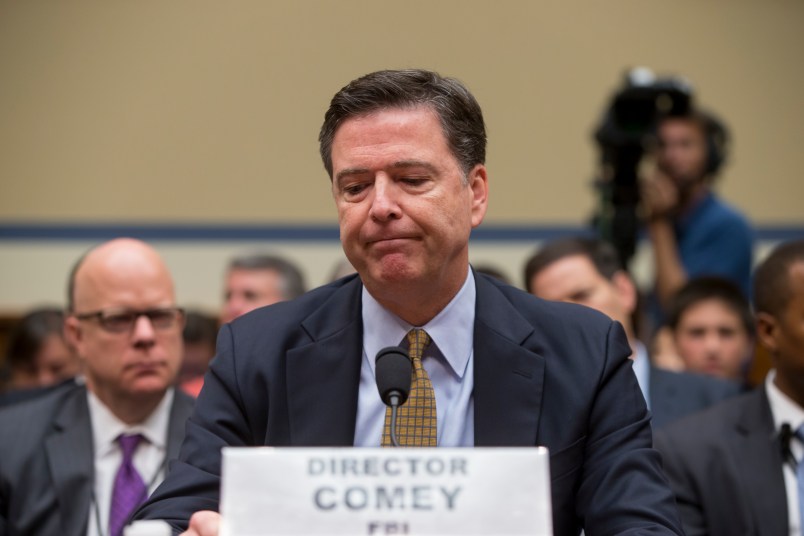Let me share a few thoughts on the latest on the emails front.
We have two contending points of view on the case. One group says Comey flagrantly violated longstanding DOJ policy (through multiple administrations) by sending this letter to the Hill. Indeed, we now have multiple reports that Attorney General Lynch told Comey he was acting outside of DOJ policy. In this view, whatever his motivations, he recklessly interfered in a national election based on little more than an effort inoculate himself from future Republican criticism. This view seems backed up by numerous former federal prosecutors from both parties.
The other group says Comey was in an impossible position. He had testified at length defending his decision not to recommend charges and said that the probe was over, if not officially closed. Based on new information, he had no choice but to supplement his testimony. Beyond this legal obligation, Comey knew there was a good chance information would leak and force his hand or that he would be blamed after the election for withholding information.
I put myself largely in camp one. But I think both sides have decent arguments on their side. One point that seems clear to me from the totality of what we’ve seen is that Comey is more sensitive to avoiding present or future criticism than addressing the equities behind the DOJ and FBI protocols that counsel against what he did. He’s been under non-stop attack – ref-playing – from congressional Republicans for over three months. I’ve heard unconfirmed reports that Rep. Chaffetz (R-UT) may have gotten wind of this new email cache and pressured Comey write the letter. Whether or not that is true, the broader point remains. Comey felt he would face Republican criticism either now or in the future if he didn’t send this letter.
But here is the issue that I think is bigger than either of these arguments. Starting more than a year ago and certainly after his July speech, Comey has totally departed from normal FBI procedure in handling this case. He has said as much. He’s justified this departure by noting the extreme public interest in the case and a heightened need for transparency.
This is not a bad argument. The problem of course is that you create a self-perpetuating cycle in which the more partisans impugn the investigation, the greater need there is to break with protocol and discuss it publicly. Wherever we come down on that question, Comey did go down this path. When did so he did much more than he needed to do. He could have given a factual explanation of what was reviewed and the logic of the recommendation against prosecution. He also included extended personal criticisms and reflections which were entirely inappropriate and not justified by any need for transparency. By going down this path – giving his unprecedented and harsh speech and testifying at length about the investigation before Congress – he may have tied his own hands when it came to updating Congress based on the new information.
But that’s not the end of the story. If he felt he was obligated to inform Congress, he must have realized that that notification would rapidly become public. Because of that, he was obligated to provide substantially more information. From the totality of what we know based on the last 24 hours of reporting, that different letter would have gone something like this:
In the course of the investigation of Anthony Weiner, investigators discovered a new batch of emails from Clinton aide Huma Abedin. We do not yet know whether any of those emails contain classified information or whether some or all are in fact duplicates of emails the FBI already obtained and scrutinized during its investigation of Secretary Clinton’s private email server. At present we have no reason to believe these newly discovered emails would change the decision reached in July. However, based on the recommendations of investigators, I have decided that we will review these emails from on the Weiner/Abedin computer to ascertain the answers to both of those questions. Out of an abundance of caution, I have taken the step to inform Congress of this new development.
Such a letter still would have been a major campaign story. But it would have had the benefit of replacing clarifying information with ambiguity and confusion.
Comey’s rejoinder would almost certainly be that the FBI does not discuss on-going investigations and certainly does not try to prejudge on-going reviews. Normally, that is 100% right. That is the bureaucratic reflex action. But that horse left the barn months ago. Comey’s key, critical error was not realizing that having already dispensed with the most central guidelines of FBI procedure on these matters he could not maintain other norms and guidelines in their entirety without a further analysis of how to address the various equities and interests these policies are normally intended to protect. In other words, once he was operating totally outside the lines – though, perhaps for good reason – he needed to give much more thought to how to address the imperative of non-interference in an election while operating outside the lines. There is little doubt that that meant sharing considerably more detail about what was happening than he did in his letter to Rep. Chaffetz (R-UT) and the other committee chairs.
As I wrote yesterday, before we knew the bulk of the information uncovered over the last 24 hours, I still do not think (though my credulity is somewhat more strained) that Comey operated out of any partisan motive. But I do think his highest priority was protecting himself and the FBI from Republican criticism. The net effect was a colossal fuck up which I fear will have profound repercussions regardless of who wins the presidency in 10 days.






